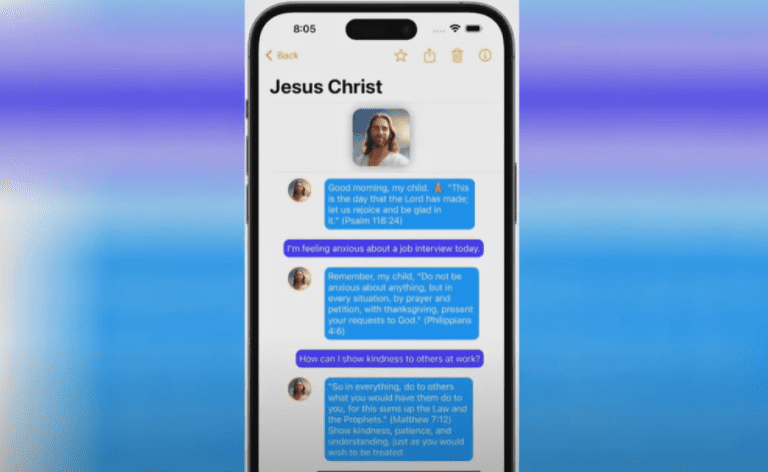
If you’ve ever wondered how Jonah felt while he was trapped inside the whale for three days, why Judas betrayed Jesus, or why Solomon had so many wives, a new app called Text with Jesus is your chance to ask yourself.
Text with Jesus, a new app launched in July, is the latest creation from Cat Loaf software, an app-development company in Los Angeles. The app replicates an instant messaging platform with biblical figures impersonated by the AI program ChatGPT. Characters available on the app include the Holy Family, the apostles, the prophets, Ruth, Job and Abraham’s nephew, Lot.
Stéphane Peter, the app’s developer and the company’s CEO said, “We stir the AI and tell it: You are Jesus, or you are Moses, or whoever, and knowing what you already have in your database, you respond to the questions based on their characters.” Peter, who founded Cat Loaf software in 2011, has built multi-static applications with historical figures, Text from the Founding Fathers, Text from Oscar White, and more recently, Text from Jesus, where users received quotes from the person in question but couldn’t interact.
When ChatGPT was released last year, the 46-year-old developer from France, who came to the United States, wondered how to use AI to upgrade the Text from Jesus app. In February, he started digging into OpenAI, the artificial intelligence research laboratory that launched ChatGPT and created a proper chat from a simple devotional app. He said, “Instead of just getting a daily Bible verse, now you get a chance through this app to chat with Jesus or anybody else in the Bible.”
There are few limits to what users can ask the app’s characters. Whether the topic is complex theological matters or personal relationship advice, they create elaborate responses using at least one Bible verse. When asked how He defined a good Christian, the app’s Jesus replied that such a person will “profess faith in me, but also follow my teachings and embody them in your life,” quoting a passage from Matthew where Jesus teaches that the greatest commandments are, “Love the Lord your God with all your heart and with all your soul and with all your mind” and “Love your neighbor as yourself.”
Many people in the Bible, Mary Magdalene among them, are only accessible in the app’s premium version, which costs $2.99 a month. “Chat with Satan” can be activated if the user chooses. The character signs all his texts with a “smiling face with horns” emoji.
Peter said he didn’t work with any theological advisers on this project and explained that he trained the AI to “try to stick to the biblical tradition as hard as possible.” But Peter did invite church leaders to try Text with Jesus once he had a beta version. Some pastors complained that some responses lacked Bible chapter and verse citations or about the strange uptight tone in which Jesus talked.
Still, on the final version, Peter said, he received “pretty good feedback” from the professionals. He said, “I updated it so it can speak more like a regular person and ensured it didn’t forget that it’s supposed to get stuff from the Bible. It’s a constant trick to find the right balance.” Suppose users are tempted to reveal sensitive information about themselves to the app’s Jesus. In that case, all data is stored temporarily long enough for the AI program to keep track of the conversation. The server does not hold any identifying information about users, Peter said.
On X, the social media platform previously known as Twitter, the launching of the app stirred reactions ranging from amusement to accusations of blasphemy and heresy. “That’s a hard NO for me,” tweeted one user. Peter anticipated the app would draw blowback but called it “another way to explore Scripture.”
